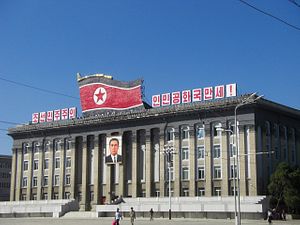Recent signs of North Korea opening itself up mean more investment opportunities in one of the world’s most isolated countries. As famous American businessman Jim Rogers once said: “Investors can make a fortune in North Korea.” If he is right, it might be the ideal time to make moves.
According to U.S.-based investment consultants, several American companies have already taken the lead.
One consultant noted during an interview with South Korea’s Yonhap Infomax that “many” American firms have shown their interests in doing business in North Korea. He added that big names such as The Coca-Cola Company, Starbucks Coffee, and McDonald’s would be interested.
The idea of doing business in North Korea might be relatively new to Western firms, but in fact, there are several existing cases of foreign businesses, mostly Chinese or Russian firms, doing just that.
Taking advantage of their governments’ strategic relationships with North Korea, many firms from China and Russia have been able to stake out a toehold in North Korea. Each firm must have a different plan and goal for doing business in North Korea, but they share one thing: Businesses are done in the form of a joint venture with the North Korean government (although there are some exceptions).
According to one report, there were more than 215 joint ventures between China and North Korea and about 30 joint firms between Russia and the North up and running as of the end of September last year.
North Korea is not an exception in this regard. In many communist nations, it’s a common tactic to require foreign firms to share control of their local businesses with the host country as a condition for market access.
North Korea’s Kim Il Sung University recently published a series of guidelines for foreign companies that are interested in doing business in North Korea. It gives a a clearer idea of the requirements.
According to the university’s guidelines, there are three options for foreign companies looking to enter North Korea.
First, there are two types of joint ventures in North Korea. One is a set-up where a foreign firm and the North Korean government equally invest and have business control over a joint venture company. The two parties also equally share the profits.
In another type of joint venture, a foreign company and the North Korean government jointly invest, but the latter has control over the business. Although the North Korean government controls the business, the partner firm can participate in a joint management committee. In this case, profits or losses are shared by both parties, according to Kim Il Sung University.
The third business option is called a “foreign company.” This option allows foreign companies to own 100 percent of their business entity in North Korea. With this option, the foreign firm has full control of the business and the North Korean government has “no rights” to influence the management. Such companies are only allowed to be set up within special economic zones across the country.
Kim Il Sung University stressed that business opportunities are open to anyone, including corporations, individuals, and ethnic Koreans living outside the North, in order to expand exchange and cooperation with other countries.
There is reason to be skeptical, though. North Korea does not yet have a proper environment for foreign companies to invest in. For instance, North Korea lacks laws, systems, and rules for dispute settlement, insurance, wages, and remittances. Infrastructure — from roads, railroads, and telecommunications to the supply of electricity, gas, and water — is extremely poor. And there are no commercial banks or insurance companies because all financial and insurance systems are controlled by the state.
McDonald’
In October 2000, North Korea’s late leader Kim Jong Il, who had a particular fondness for McDonald’s hamburgers, reportedly instructed that companies begin to produce and supply hamburgers to party members.
When North Korean companies failed to make hamburgers and fries properly, Kim ordered Kenji Fujimoto, a Japanese cook who was Kim’s personal sushi chef from 1988 to 2001, to fly to Beijing by Air Koryo and buy a Big Mac, the iconic McDonald’s burger.
Then, North Korea tested McDonald’s willingness to enter Pyongyang in 2008. At that time, McDonald’s did not push forward because such a project would have cost millions of dollars in initial investment expenses and because North Korea did not have the necessary infrastructure for growth.
The fact that the United States and UN have not eased sanctions against Pyongyang is also an obstacle. It goes without saying that denuclearization is the mainstay of inter-Korean economic cooperation. Without denuclearization, sanctions cannot be lifted, and the progress of inter-Korean economic cooperation is difficult. The United States has made it clear that it does not plan to lift its sanctions until the North completes its denuclearization process.
































